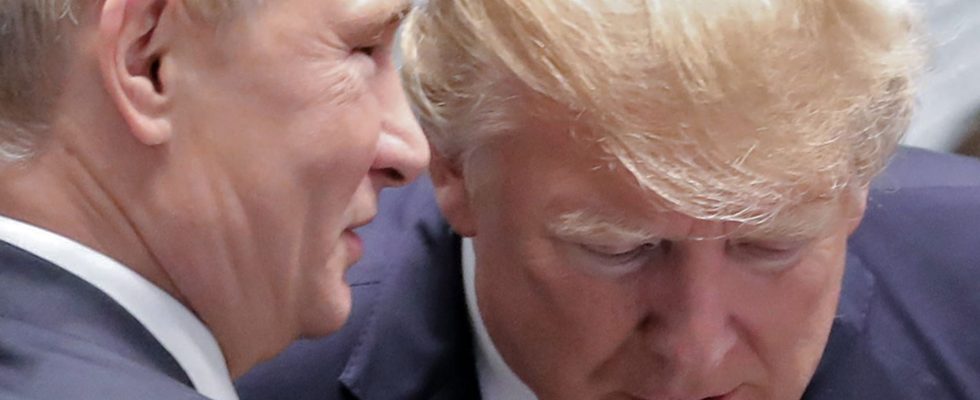Stopping the war in Ukraine “is very easy”, according to Donald Trump. On the first anniversary of the conflict in March, he explained without laughing that he would end it “in twenty-four hours”. On the NBC channel, President Volodymyr Zelensky responded to him on November 5: “If he is willing to come here, I would only need… twenty-four minutes, no more, to explain to him that he cannot resolve this conflict so quickly; that it cannot bring peace because of Putin.” One year before the American presidential election, the prospect of the return of Donald Trump worries kyiv, weakened by an unsuccessful counter-offensive and almost two years of war.
Because if “Trump the braggart” proclaims that he will be the man capable of avoiding World War III, he has not detailed his strategy for resolving the conflict. “I will say certain things to Putin, and then certain things to Zelensky, and the two will be reconciled,” he said in an interview in September. “I’ll make a fair deal for everyone.” And this is not the only reason for concern among Ukrainians: already, in February 2022, the ex-president had also estimated that the decision of the head of the Kremlin to declare the independence of two separatist Ukrainian republics, in the Donbass , bordered on “genius”.
If Trump’s tropism for Putin and Moscow is well known, the Ukrainian elite refuses to give in to pessimism. “We can talk to him and he will listen,” reassures former Ukrainian Foreign Minister Pavlo Klimkin, a follower of the Coué method. To convince businessman Trump, kyiv could use mercantile arguments. “If we show him that the war in Ukraine is beneficial to the American defense industry, then he could change his mind,” hopes Oleksandr Kraïev, specialist in American-Ukrainian relations at the Ukrainian Prism think tank.
It will also be necessary to convince the many Republican elected officials – and public opinion – opposed to aid to Ukraine to change their minds. This is what Volodymyr Zelensky tried to do in Washington in September. Without success: last month, the American Congress cut 6 billion dollars in military aid to avoid the shutdown, pushed by polls less and less favorable to kyiv. Last June, 65% of Americans believed that Washington should provide weapons to Ukraine. Today, the proportion has fallen to 41%.
Beyond Ukraine, EU countries are also concerned. The possibility that Washington – kyiv’s primary military supporter, with 42 billion euros promised between January 2022 and July 2023 – will turn away from the conflict is real. “This is why the European chancelleries plan to increase contacts with members of the Republican Party in Congress,” notes Alexandra de Hoop Scheffer, specialist in American geopolitics at the German Marshall Fund, in Paris. The Congress is also in the process of implementing places legislative barriers aimed at preventing Trump from making untimely decisions. During his first term, he had actually considered the withdrawal of the United States from NATO; he could do the same with regard to aid for Ukraine.” It is therefore high time to find alternative sources of financing, believes former minister Pavlo Klimkin: “We cannot bet everything on one person, even if that person is the President of the United States.” Especially if that president is Donald Trump.
At the beginning of November, during a videoconference intervention at the 16th World Policy Conference, organized in Abu Dhabi by the French Institute of International Relations, the current Ukrainian Minister of Foreign Affairs Dmytro Kuleba tried to find reassuring words: “The next package of 3 billion dollars of humanitarian and military aid will arrive soon. What worries me right now is not the American presidential election but the health of my children, my loved ones, my compatriots, said Kuleba “In the midst of war, fear is not a good advisor. What matters right now is the support of the American Congress for the 2024 aid package. The American vote is still far away.” But he’s getting closer.
